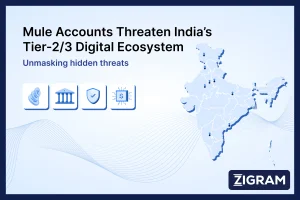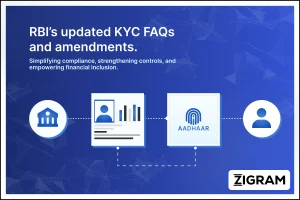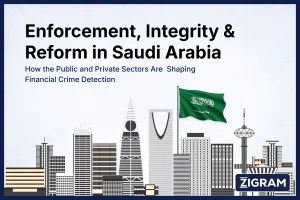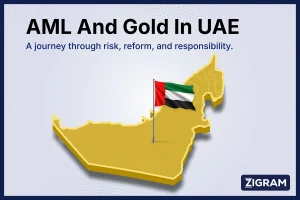India’s recent general election has significantly reshaped the landscape of anti-money laundering (AML) and sanctions screening. With the inclusion of over 8,000 candidates into our database of Politically Exposed Persons (PEPs), RegTech companies like ours are now better positioned to offer comprehensive and timely due diligence services. The term Politically Exposed Person (PEP) varies in its definition across regulatory frameworks, encompassing individuals holding pivotal public roles such as Heads of State, senior politicians, government officials, judiciary or military personnel, and senior executives of state-owned corporations.

In response to the escalating risks of corruption and money laundering associated with PEPs, the financial sector is increasingly emphasizing PEP screening. This screening is critical for ensuring compliance with stringent Anti-Money Laundering (AML) regulations and forms an integral part of Know Your Customer (KYC) procedures. By expanding the scope of PEPs to include individuals contesting elections and gathering comprehensive information on their Political Party Name, Constituency, and State, institutions can glean valuable insights into potential risks and enhance their due diligence processes.
This article aims to delve into the significance of election data for AML and sanctions screening, elucidate the specific requirements for screening candidates and their associates, and underscore the competitive advantage derived from leveraging this enriched dataset. By exploring these dimensions, we can gain a deeper understanding of how election data integration can fortify AML and sanctions screening protocols, ultimately bolstering the integrity and resilience of the financial ecosystem.
Why is Election Data Valuable for AML/Sanctions Screening?
Election periods serve as focal points of heightened political activity, necessitating effective identification of Politically Exposed Persons (PEPs) to mitigate associated risks. India’s general elections, occurring from April 19 to June 1, 2024, provide a significant source of data for AML and sanctions screening. The Election Commission furnishes extensive information on candidates, party officials, and elected representatives, all falling under the PEP classification due to their increased susceptibility to bribery and corruption.
Leveraging election data offers several benefits for bolstering AML and sanctions screening efforts:
Comprehensive PEP Identification:
Publicly available election data enables the identification of individuals who might otherwise not be flagged as PEPs in traditional databases. By incorporating election data into screening processes, organizations ensure a more exhaustive vetting procedure, minimizing the risk of overlooking politically exposed individuals.
Risk Profile Assessment:
Election data facilitates the evaluation of risk profiles associated with individuals and businesses linked to candidates or winning parties. Analysis of campaign donations, past controversies, and affiliations can unveil potential red flags indicative of money laundering or connections to sanctioned entities. This comprehensive assessment enhances the efficacy of risk mitigation strategies.
Unexplained Wealth Detection:
Elections often witness instances of suspicious financial activities aimed at influencing outcomes. Election data serves as a valuable tool for cross-referencing with financial records to identify candidates or associates exhibiting unexplained wealth. Detection of unexplained wealth serves as a crucial indicator for potential money laundering activities, enabling proactive intervention and risk mitigation measures.
Integration with Sanctions Screening:
Synergistic integration of election data with sanctions lists enhances the efficacy of sanctions screening processes. By cross-referencing election data with sanctioned entity lists, organizations can identify individuals or businesses associated with sanctioned entities seeking political influence or utilizing elections as a means to launder illicit funds. This integration strengthens due diligence procedures and aids in the identification of high-risk entities.
Categorization and Analysis
Politically Exposed Persons (PEPs) are segmented into four distinct risk levels, ranging from high to low, based on their potential impact on financial institutions. High-risk PEPs typically comprise heads of state, government officials, and military leaders, while medium-risk PEPs may include local government officials or lower-ranking military officers. Low-risk PEPs encompass individuals with minimal influence, such as municipal representatives. Level 1 denotes the highest risk level, indicating individuals with the most significant potential impact.
In the context of India’s general elections, candidates vying for political office are classified as Level X PEPs, reflecting their substantial influence and exposure during the electoral process. This categorization underscores their significance within the political landscape and highlights the heightened scrutiny they warrant in AML and sanctions screening procedures. Moreover, our analysis extends beyond mere categorization to include comprehensive data on candidates’ spouses, associated parties, and political affiliations.
This meticulous examination enriches the depth and accuracy of our screening capabilities, enabling us to identify potential risks more effectively and mitigate them proactively. By delving into these additional layers of information, we enhance our ability to discern intricate connections and patterns that may pose inherent risks to financial institutions, thereby fortifying our clients’ compliance efforts and safeguarding against potential threats.
Understanding the Implications of PEP Involvement in Money Laundering
PEPs present a considerable risk concerning money laundering, given their access to public funds and potential sway over financial systems. The implications of PEP involvement in money laundering are far-reaching. Firstly, financial institutions risk significant reputational damage if they inadvertently become entangled in money laundering activities due to inadequate PEP screening. This loss of public trust can have lasting repercussions on the institution’s brand and standing within the financial sector.
Regulatory fines present another consequence of insufficient PEP screening, with bodies such as the Reserve Bank of India (RBI) imposing substantial penalties for non-compliance with Anti-Money Laundering/Combating the Financing of Terrorism (AML/CFT) regulations. Such fines often stem from inadequate measures to screen PEPs effectively. Moreover, the legal ramifications of PEP involvement in money laundering are severe, with authorities empowered to take stringent action against individuals and entities implicated in such activities. This may include asset seizure, hefty fines, and even imprisonment.
Compliance and Risk Management
Integrating election commission data into screening processes enables financial institutions and fintech firms to comply with regulatory standards and mitigate PEP and sanctioned entity risks. Screening candidates, spouses, and associates reveals potential red flags for money laundering and corruption, aligning with India’s regulatory guidelines mandating PEP screening across sectors. Requirements vary: the RBI mandates KYC procedures for financial institutions, SEBI regulates PEP screening for listed companies, and sensitive government positions demand thorough background checks, including spousal information for security clearances.
Financial institutions face significant risks posed by Politically Exposed Persons (PEPs), primarily in the realms of reputation and transactions. To effectively mitigate these risks, institutions employ comprehensive strategies that encompass several key steps. Firstly, institutions prioritize the identification of PEPs and their close associates, implementing robust screening mechanisms to uncover individuals holding positions of political influence. Through thorough due diligence processes, institutions ascertain the extent of these individuals’ involvement in political spheres, conducting detailed risk assessments considering factors such as their level of influence, access to public funds, and potential involvement in illicit activities.
This meticulous evaluation informs subsequent mitigation strategies, which may include enhanced due diligence measures, customized monitoring protocols, and fortified reporting mechanisms. By adopting these strategies, institutions fortify their defenses against potential reputational and transactional risks. Explore our article on Understanding RBI Master Direction Guidelines for AML, Sanction, and PEP Screening to delve deeper into this critical aspect of risk management. Click here to learn more about it.
The Imperative of Screening Against Election Commission Data
The requirement for fintechs, banks, financial institutions, and payment aggregators to screen individual details against election commission data, including candidates, spouses, and associated parties, is driven by several critical factors:
1. Mitigating Financial Crime Risks:
Financial institutions are vulnerable to exploitation by individuals involved in financial crimes such as money laundering, bribery, and corruption. Politically exposed persons (PEPs), including candidates and their associates, pose a higher risk due to their potential influence and access to significant resources. Screening against election commission data helps identify such PEPs and mitigate the risk of facilitating illicit financial activities.
2. Ensuring Regulatory Compliance:
Regulatory authorities impose stringent compliance requirements on financial institutions to prevent money laundering, terrorist financing, and other illicit activities. Many jurisdictions mandate the screening of individuals against PEP lists, which often include candidates and their associates. By screening against election commission data, financial institutions demonstrate compliance with these regulatory obligations.
3. Protecting Against Reputational Damage:
Being associated with individuals involved in corruption or other illicit activities can tarnish the reputation of financial institutions and payment aggregators. By screening candidate details, including spouses and associated parties, against election commission data, these entities can safeguard their reputation and maintain the trust of their customers and stakeholders.
4. Enhancing Due Diligence Processes:
Financial institutions are required to conduct thorough due diligence on their customers and counterparties to assess their risk profile and ensure regulatory compliance. Screening against election commission data provides additional insights into the backgrounds of individuals, enabling more robust due diligence processes and better risk assessment.
5. Preventing Regulatory Penalties and Legal Liabilities:
Failure to comply with regulatory requirements related to screening for PEPs and politically exposed businesses (PEBs) can result in severe penalties, including fines, sanctions, and legal actions. By implementing effective screening measures, financial institutions and payment aggregators mitigate the risk of regulatory non-compliance and associated liabilities.
6. Supporting National and International Efforts Against Financial Crime:
Screening against election commission data aligns with broader national and international efforts to combat financial crime and uphold the integrity of the financial system. By actively participating in these efforts, financial institutions and payment aggregators contribute to the overall stability and security of the global financial ecosystem.
ZIGRAM’S Competitive Advantage in AML/Sanctions Screening
The recent Indian general election has presented a unique opportunity to strengthen our position as a leader in AML and sanctions screening. By consistently tracking and updating election data, we've gained a significant first-mover advantage that translates into tangible benefits for our clients. Here's how our approach sets us apart from the competition.
Minimizing False Positives:
Traditional PEP lists primarily focus on individuals already holding official positions. This approach can generate a high number of false positives, leading to wasted time and resources for investigators. We go beyond this limitation by capturing candidates and their associates during the election cycle. This broader view reduces false positives and ensures you're focusing on the most relevant individuals.
Deeper Database with Level X PEPs:
Including Level X PEPs (candidates and associates) significantly expands the depth of our database. This provides a more holistic view of potential risks by incorporating individuals who may exert political influence but haven't yet assumed official positions. With our comprehensive database, you gain a clearer picture of the political landscape and the potential actors involved.
Focus on Influence, Not Just Position:
Political influence can extend far beyond those holding official titles. We recognize this by considering not just the candidate themselves but also their spouses and associated parties, as disclosed in the candidate's affidavit. This granular approach ensures you don't miss any potential red flags that might arise from a candidate's network of connections.
By incorporating these elements, our comprehensive screening solutions empower you to identify PEPs more effectively, assess risk profiles with greater accuracy, and ultimately, uncover potential financial crimes during elections. This focus on a broader spectrum of political actors, along with our commitment to data accuracy and regulatory compliance, positions us as the ideal partner for your AML and sanctions screening needs. For a Free Demo, Click Here.
- #PEP
- #Database
- #India
- #GeneralElection
- #ElectionCommission
- #Compliance
- #RiskManagement






